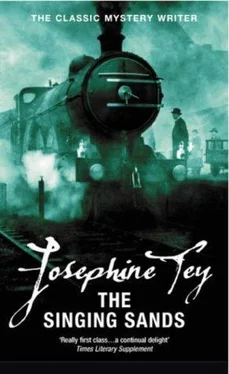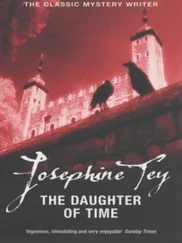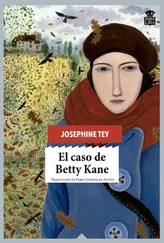‘It became an obsession with him.’
‘That’s about it, I suppose.’
‘Did he have other interests?’
‘He read books,’ Mr Cullen said, in an apologetic way; as one confessing a peculiarity in a friend. ‘Even in that, it showed.’
‘How: showed?’
‘I mean, instead of the books being the usual story affairs they’d as likely as not be about Arabia.’
‘Yes?’ Grant said, thoughtfully. Ever since this stranger had first mentioned Arabia, Grant had been altogether ‘with him’. Arabia to all the world meant one thing: sand. And what was more, he realised that when he had had the feeling, that morning in the Scoone hotel, that ‘singing sands’ did actually exist somewhere, it was with Arabia that he should have connected them. Somewhere in Arabia there were in fact sands that were alleged to sing.
‘So I was glad when he took his “leave” earlier than he meant to,’ Mr Cullen was saying. ‘We had planned to go together, and spend our leave in Paris. But he changed his mind and said he wanted a week or two in London first. He’s English, you know. So we arranged to meet at the Hotel St Jacques in Paris. He was to meet me there on the 4th of March.’
‘ When? ’ said Grant; and was suddenly still. Mind and body still, like a pointer with the bird in sight; like a man with the target in his sights.
‘The 4th of March. Why?’
Singing sands were anyone’s interest. Men who fly for OCAL were two a penny. But the wide, vague, indefinite affair of Bill Kenrick who was obsessed with Southern Arabia and did not turn up to his appointments in Paris narrowed suddenly to one small focused point. To a date.
On the 4th of March, when Bill Kenrick should have turned up in Paris, the London mail had come into Scoone bearing the dead body of a young man who was interested in singing sands. A young man with reckless eyebrows. A young man who, on looks, would have made a very likely flyer. Grant remembered that he had tried him, in imagination, on the bridge of a small ship; a fast small ship, hell in any kind of a sea. He had looked well there. But he would look just as well at the controls of a plane.
‘Why did Bill choose Paris?’
‘Why does anyone choose Paris!’
‘It wasn’t because he was French?’
‘Bill? No, Bill’s English. Very English.’
‘Did you ever see his passport?’
‘Not that I can remember. Why?’
‘You don’t think that he might have been French by birth?’
It wouldn’t work out, anyway. The Frenchman was called Martin. Unless his English upbringing had made him want to adopt an English name?
‘You don’t happen to have a photograph of your friend, do you?’
But Mr Cullen’s attention was on something else. Grant turned to look, and found that Zoë was approaching them along the river bank. He looked at his watch.
‘Hell!’ he said. ‘And I promised to have the stove going!’ He turned to his bag and fished the primus from it.
‘Your wife?’ asked Mr Cullen, with that refreshing frankness. In the Islands it would have taken five minutes conversation to have elicited that information from him.
‘No. That’s Lady Kentallen.’
‘Lady? A title?’
‘Yes,’ Grant said, busy with the stove. ‘She is Viscountess Kentallen.’
Mr Cullen considered this in silence for a little.
‘I supposed that’s a sort of marked-down Countess.’
‘No. On the contrary. A very superior kind. Practically a Marchioness. Look, Mr Cullen, let’s postpone this matter of your friend for a little. It’s a matter that interests me more than I can say, but—’
‘Yes, of course, I’ll go. When can I talk to you again about it?’
‘Of course you will not go! You’ll stay and have some food with us.’
‘You mean you want me to meet this Marchioness, this—whatyoumaycallit, Viscountess?’
‘Why not? She is a very nice person to meet. One of the nicest persons I know.’
‘Yes?’ Mr Cullen looked with interest at the approaching Zoë. ‘She’s certainly very nice to look at. I didn’t know they came like that. Somehow I imagined all aristocrats had beaky noses.’
‘Specially provided for looking down, I take it.’
‘Something like that.’
‘I don’t know how far back in English history one would have to go to find an aristocratic nose that was looked down. I doubt if you’d find one at all. The only place to find a looked-down nose is in the suburbs. In what is known as lower-middle-class circles.’
Mr Cullen looked puzzled. ‘But the aristocrats keep themselves to themselves and look down on the rest, don’t they?’
‘It has never been possible in England for any class to keep themselves to themselves, as you call it. They have been intermarrying at all levels for two thousand years. There never have been separate and distinct classes—or an aristocratic class at all in the sense that you mean it.’
‘I suppose nowadays things are even-ing up,’ Mr Cullen suggested, faintly unbelieving.
‘Oh, no. It has always been a fluid thing. Even our Royalty. Elizabeth the First was the grand-daughter of a Lord Mayor. And you’ll find that Royalty’s personal friends have no titles at all: I mean the people who are on calling-terms at Buckingham Palace. Whereas the bold bad baron who sits next you in an expensive restaurant probably started life as a platelayer on the railway. There is no keeping oneself to oneself in England, as far as class goes. It can’t be done. It can only be done by Mrs Jones who sniffs at her neighbour Mrs Smith because Mr Jones makes two pounds a week more than Mr Smith.’
He turned from the puzzled American to greet Zoë. ‘I’m truly sorry about the stove. I’m afraid I got it going too late to be ready. We were having a very interesting conversation. This is Mr Cullen, who flies freight for Oriental Commercial Airlines.’
Zoë shook hands, and asked him what kind of plane he flew.
From the tone of his voice when he told her Grant deduced that Mr Cullen thought that Zoë was merely taking a condescending interest. Condescension was what he would expect from an ‘aristocrat’.
‘They’re very heavy in hand, aren’t they?’ Zoë remarked sympathetically. ‘My brother used to fly one when he was on the Australia run. He was always cursing it.’ She began to open the packets of food. ‘But now that he works in an office in Sydney he has a little runabout of his own. A Beamish Eight. A lovely thing. I used to fly it when he first bought it; before he took it to Australia. David—my husband—and I used to dream of having one too, but we could never afford it.’
‘But a Beamish Eight costs only four hundred,’ Mr Cullen blurted.
Zoë licked her fingers, sticky from a leaking apple tart, and said: ‘Yes, I know, but we never had four hundred to spare.’
Mr Cullen, feeling himself being washed out to sea, sought some terra firma.
‘I oughtn’t to be eating your food this way,’ he said. ‘They’ll have plenty for me back at the hotel. I really ought to go back.’
‘Oh, don’t go,’ Zoë said with a simplicity so genuine that it penetrated even Mr Cullen’s defences. ‘There is enough for a platoon.’
So to Grant’s pleasure in more ways than one, Mr Cullen stayed. And Zoë, unaware that she was providing the United States with a revised view of the genus English Aristocrat, ate like a hungry schoolboy and talked in her gentle voice to the stranger as if she had known him all her life. By the apple tart stage, Mr Cullen had ceased to be on his guard. By the time that they were handing round the chocolates that Laura had included he had surrendered unconditionally.
They sat together in the spring sunshine, full-fed and content. Zoë lying back against the grassy bank with her feet crossed and her hands behind her head, her eyes closed against the sun. Grant with his mind busy with B Seven, and the material that Tad Cullen had brought him. Mr Cullen himself perched on a rock looking down the river to the green civilised strath where the moors ended and the fields began.
Читать дальше












